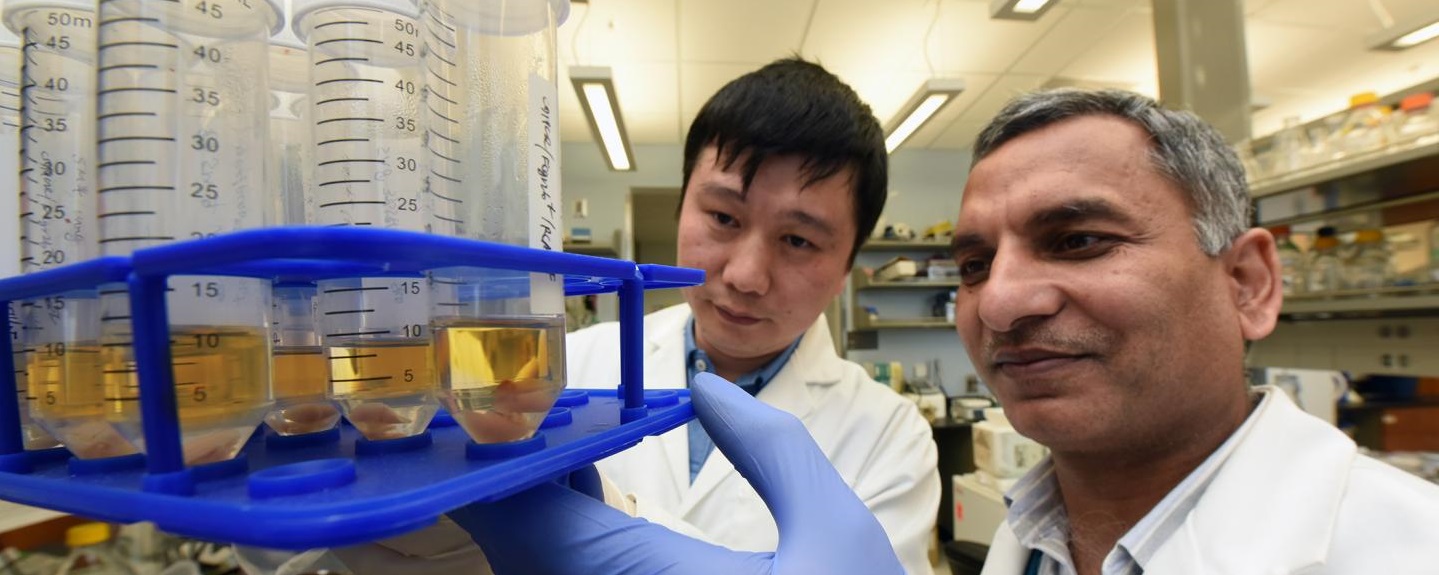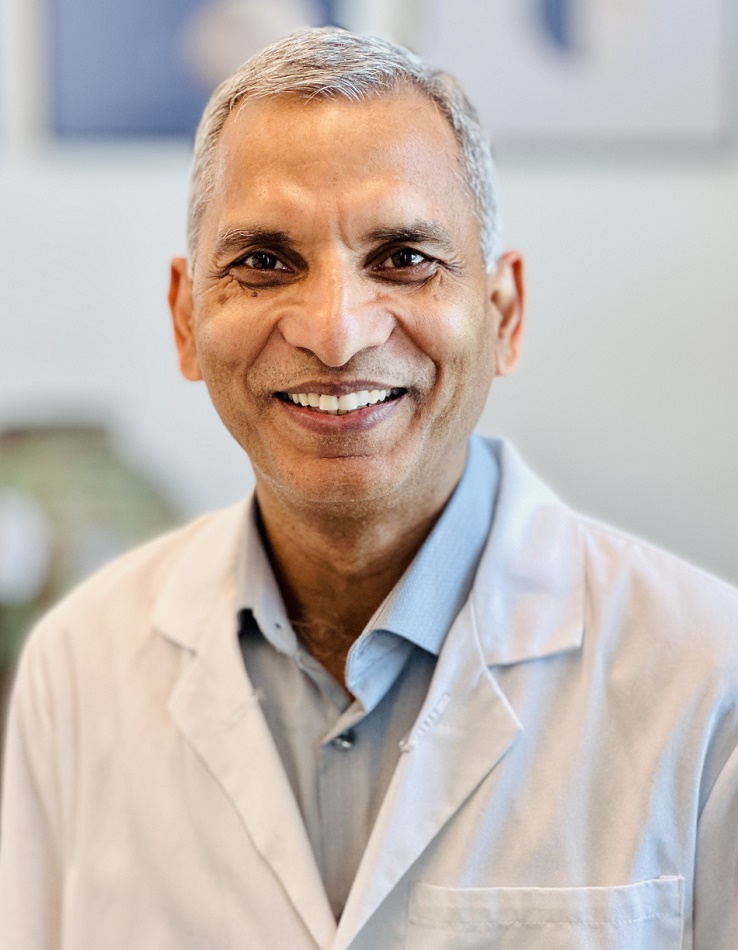
Singh Laboratory

Dr. Nagendra Singh
Professor, Department of Biochemistry & Molecular BiologyDr. Singh’s laboratory studies molecular and cellular mechanisms of underlying immune responses against pathogens and cancers. We utilize a variety of immunological, epigenetic, molecular, biochemical, and cellular techniques to study the behavior of immune cells during pathological conditions.
One of the ongoing projects in the laboratory involve studying the development, survival, and function of plasma cells. Plasma cells are factory for producing antibodies molecule that neutralize the invading pathogens. Understanding of these mechanisms is critical in designing improved vaccines against pathogens.
His other research interest includes how T cells are activated and generate immune responses and help other immune cells to successfully eliminate invading pathogens and cancers. Under this project, he is studying how T cells become exhausted or toothless during chronic infection and cancers.
Previously, he discovered the mechanism underlying dietary fiber mediated induction of anti-inflammatory mechanisms in intestine such as Treg cells leading to suppression of intestinal inflammation and cancers.
His research is funded by extramural sources such as NIH/NIAID.
Selected Publications:
- Yang W, Yu T, Huang X, Bilotta AJ, Xu L, Lu Y, Sun J, Pan F, Zhou J, Zhang W, Yao S, Maynard CL, Singh N, Dann SM, Liu Z, Cong Y. Intestinal microbiota-derived short-chain fatty acids regulation of immune cell IL-22 production and gut immunity. Nature Communications Sep 8;11(1):4457 (2020). doi: 10.1038/s41467-020-18262-6.PMID: 32901017.
- Zhu H, Bhatt B, Sivaprakasam S, Cai Y, Liu S, Kodeboyina SK, Patel N, Savage NM, Sharma A, Kaufman RJ, Li H and Singh N. Ufbp1 promotes plasma cell development and ER expansion by modulating distinct branches of UPR. Nature Communications March 6 10(1):1084 (2019).
- Bhatt B, Zeng P, Zhu H, Sivaprakasam S, Li S, Xiao H, Dong L, Shiao P, Kolhe R, Patel N, Li H, Levy-Bercowski D, Ganapathy V, Singh N. Gpr109a Limits Microbiota-Induced IL-23 Production to Constrain ILC3-Mediated Colonic Inflammation. J Immunology Mar 7 (2018). [Epub ahead of print] PMID: 29514953.
- Zhu H, Lemos H, Bhatt B1, Islam BN, Singh A, Gurav A, Huang L, Browning DD, Mellor A, Fulzele S and Singh N. Carbidopa, a drug in use for management of Parkinson disease inhibits T cell activation and autoimmunity. PLoS One Sep 12;12(9):e0183484 (2017).
- Sivaprakasam S, Gurav A, V Paschall A, Coe GL, Chaudhary K, Cai Y, Kolhe R, Martin P, Browning D, Huang L, Shi H, Sifuentes H, Vijay-Kumar M, Thompson SA, Munn DH, Mellor A, McGaha TL, Shiao P, Cutler CW, Liu K, Ganapathy V, Li H, and Singh N. An essential role of Ffar2 (Gpr43) in dietary fibre mediated promotion of healthy composition of gut microbiota and suppression of intestinal carcinogenesis. Oncogenesis 5, e238 (2016); doi:10.1038/oncsis.2016.38
- Cai Y, Pi W, Sivaprakasam S, Zhu X, Zhang M, Chen J, Makala L, Lu C, Wu J, Teng Y, Pace B, Tuan-Lo D, Singh N*, Li H*. Indispensable role of the Ufm1 conjugation system in hematopoietic stem cell survival and erythroid development. PLoS Genet. 11:e1005643 (2015). (*corresponding authors)
- Singh N*, Gurav A, Sivaprakasam S, Brady E, Padia R, Shi H, Thangaraju M, Prasad PD, Manicassamy S, Munn DH, Lee JR, Offermanns S, & Ganapathy V*. Activation of Gpr109a, Receptor for Niacin and the Commensal Metabolite Butyrate, Suppresses Colonic Inflammation and Carcinogenesis. Immunity 40:128 (2014) PMID: 24412617 (*corresponding authors)
- Zhang M, Zhu X, Zhang Y, Cai Y, Chen J, Sivaprakasam S, Gurav A, Pi W, Makala L, Wu J, Pace B, Tuan-Lo D, Ganapathy V, Singh N* and Li H*. RCAD/Ufl1, an Ufm1 E3 ligase, is essential for hematopoietic stem cell function and murine hematopoiesis. Cell Death Differ. Dec, 22:1922 (2015). (*corresponding authors)
- Singh N, Yamamoto M, Takami M, Seki Y, Takezaki M, Mellor AL, and Iwashima M. CD4+CD25+ regulatory T cells resist a novel form of CD28-and Fas-dependent p53-induced T cell apoptosis. J Immunology 184:94 (2010) PMID: 19949106
- Singh N, Chandler PR, Seki Y, Baban B, Takezaki M, Kahler DJ, Munn DH, Larsen CP, Mellor AL, and Iwashima M. Role of CD28 in fatal autoimmune disorder in scurfy mice. Blood 110:1199 (2007) PMID: 17463170
- Singh N, Seki Y, Takami M, Seki Y, Baban B, Chandler P, Khosravi D, Zheng X, Takezaki M, Lee JR, Mellor AL, Bollag W and Iwashima M. Enrichment of regulatory CD4+CD25+ T cells by inhibition of phospholipase D signaling. Nature Method 3:629 (2006) PMID: 16862138